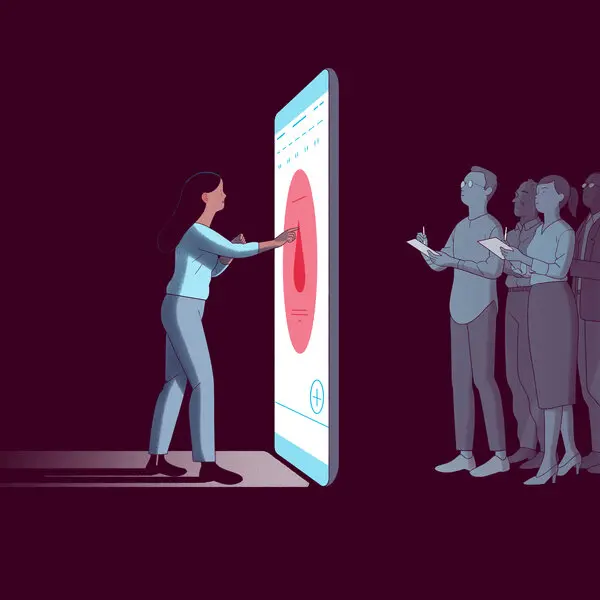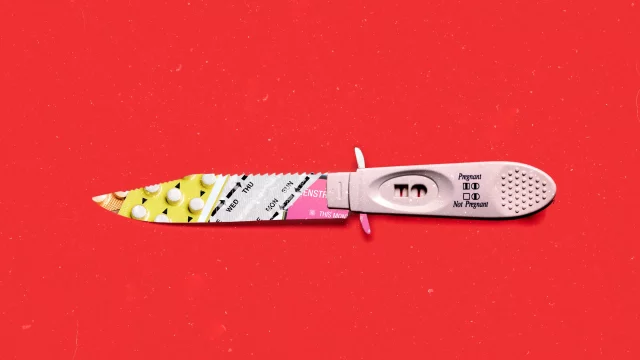As we are fast approaching the space age, technology and lifestyle are advancing at light speed. So would it be natural to believe that with rapid digital enhancement, humans’ well-being and basic civil rights are also advancing way ahead of past times?
Well, the real situation is exactly the opposite of that. Now period tracking apps could get women arrested.
What Is Happening?
In a first-world country like the US, which is technically looked up to as a leader of nations, the Supreme Court had recently overturned the landmark 1973 Roe v Wade verdict, thereby restricting access to legal abortion for women living in the ‘land of the free.
Among the devastating effects of this ruling, women are being compelled to delete period apps, fearing the tracking of their personal data online.

After the US juridical authority made it clear that abortion would be seen as murder, American women have received online appeals to erase digital footprints regarding their reproductive health.
The primary concern is that period tracking apps could be accessed by law enforcement, thus allowing investigations to be carried out against people seeking abortion services.
Earlier, it was customary for millions of American women to use period apps that keep track if they are ovulating or missing a cycle, or notify them regarding potential pregnancies or miscarriages.
A survey conducted by Kaiser Family Foundation in 2019 revealed that nearly a third of Americans had tracked their menstrual cycle with a period app, with 15% saying that they do so at least once a month.
Period Tracking Apps and Safety of Data
But presently reliance on a digital period tracker could possibly mean risking legal prosecution. Over 1300 cases of pregnancy-related criminalization between 2006 and 2020 were found by the group National Advocates for Pregnant Women. The Surveillance Technology Oversight Project, a non-profit legal services provider, has warned that period apps are a “potent source of data for police”.
Criticism has been mounting on several period tracking apps. In 2021, the makers of the fertility and period app Flo were taken to task by the Federal Trade Commission (FTC) after they allegedly misled customers and leaked personal health information to third parties like Facebook and Google.
The legal intricacies involved with period apps storing information on a cloud are elaborated by William Budington, a senior staff technologist at the Electronic Frontier Foundation.
He says, “When your data is stored with a third-party server, then it is no longer yours and subject to the power of subpoena, so an overzealous prosecutor in a state which has overturned the right to choose [an abortion] is able to, in some cases, subpoena companies that have information: how often are you having your period, or if you haven’t had your period.”

Clue, a popular period tracking app that processes data on a server, had stated, “Our business model is not based on profiting from our users’ personal data –– we don’t sell them products based on what they track, we do not share any tracked data with ad networks, and we certainly do not sell our users’ data to any third parties …
We would not respond to any disclosure request or attempted subpoena of our users’ health data by U.S. authorities. But we would let you and the world know if they tried.”
Budington further stresses that despite the promises of non-disclosure forwarded by period app companies after the Roe v Wade ruling, there is no absolute protection against handing over women’s health information to the legal authorities. He says the best way is simply not to use them. “The underlying fact is if they never have the data in the first place, then they can’t hand it over.”
Besides avoiding such period apps altogether, Budington also sanctions the use of apps like Euki, which directly states on its website that it does not gather or preserve any data on a cloud.
Period trackers like Drip, Euki, and Periodical were evaluated and thereby recommended by Consumer Reports’ digital lab team. They were cleared of legal risks as they store data locally on one’s phone and do not permit third-party tracking.
But other experts advise refraining from period tracking apps altogether. Grace Howard, an assistant professor of justice studies at San José State University who researches the criminalization of pregnancy, said that the period apps are just one way out of many others in which the authority can monitor American women’s personal health.
Other Potential Ways To Track Your Data
Besides menstrual tracking apps, web searches and text conversations are at risk of getting detected by law enforcement agencies. Hence Howard advises, “People need to use VPNs, private browsers, and encrypted chat services when they search for abortion care or discuss it.”
According to representatives of technological firms, there is ample fear that the police would start seeking the search history of customers, geolocation, and other information that shows plans to terminate a pregnancy.

Corporates Doing Their Bit
Tech giants like Meta, Microsoft, Tesla, Amazon, and others have decided to sponsor employees who need to travel to other states to secure legally sanctioned abortion.
Google’s Chief People Officer Fiona Cicconi noted in an official email to employees- “Googlers can also apply for relocation without justification, and those overseeing this process will be aware of the situation.”
She also expressed concern about the gravity of this change that deeply affects people in the US, especially women.
Abortion Charges In The Past
There have been past cases of criminalizing parents seeking an abortion. For instance, in 2016 Lattice Fisher from Mississippi was convicted under charges of second-degree murder after a home abortion.
As evidence, the police tracked her phone search history which showed a search for ‘abortion pills’. She admitted to not having been in a position to support another child and claimed that she experienced a stillbirth at roughly 36 weeks. But in spite of her efforts, she landed up in jail, only to be released after 3 years.
Another case in 2018 saw Mississippi police tracking down another woman’s online queries of “buy abortion pills”, “mifepristone online”, and “misoprostol online”. Criminal charges were brought against her following a miscarriage. But soon after, a grand jury reversed these charges.
Danielle Keats Citron, a University of Virginia law school professor and author of the forthcoming book “The Fight for Privacy: Protecting Dignity, Identity, and Love in the Digital Age”, said, “Hundreds of people have already been arrested and charged with crimes against their own pregnancies for things like having expressed uncertainty about their pregnancy and then having a miscarriage or stillbirth; testing positive for a drug; failing to protect themselves for abuse; self-managing abortions, etc. Arrests of this nature have happened in almost every state.”
Citron says that deleting period tracking apps might be necessary, but not sufficient in the present climate where women risk ending up in prison due to their biological constraints. Even if they delete period apps, if their phone location is on, they could risk leaking their visit to a Planned Parenthood center.
She said, “Unless you throw your phone in the ocean and you stop using your computer, I’m afraid to say it would be very hard to make yourself immune from criminal liability. That is why this is a structural problem.”
Eva Galperin, cybersecurity director at the Electronic Frontier Foundation, tweeted after the Roe v Wade verdict, “The difference between now and the last time that abortion was illegal in the United States is that we live in an era of unprecedented digital surveillance.”
Disclaimer: This article is fact-checked
Sources: The Indian Express, Huff Post, India Today
Image sources: Google Images
Feature Image designed by Saudamini Seth
Find The Blogger: shoomedha
This post is tagged under: #PeriodEmoji, #periodleaves, bloggers fight it out over celebration of periods, bodyform period campaign, celebrating first period, celebrating periods, celebration of periods, do only women get period, roe vs wade, abortion, abortion in special cases, abortion law in india vs abroad, abortion laws in the world, abortion rights, abortion rights movement, abortion stigma, anti abortion, Are Abortion Laws In India More Progressive Than Other Parts Of The World?, International Day of Action for Access to Safe and Legal Abortion, Legal Abortion, Legalise abortion, safe abortion, #ByWomenForWomen, women’s rights, anti feminism india, Feminism, feminism awareness
We do not hold any right over any of the images used, these have been taken from Google. In case of credits or removal, the owner may kindly mail us.
Other Recommendations:
ResearchED: South India Celebrates The Onset Of Menstruation In Girls





























